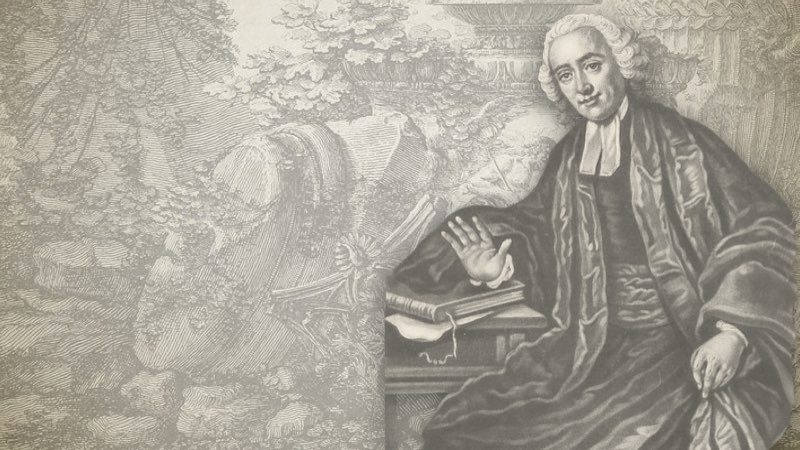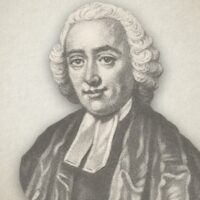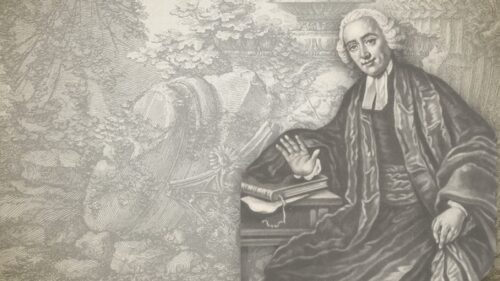
The Life And Ministry Of William Romaine
William Romaine—The Sower 1895:
The Centenary Of His Death
William Romaine was born at Hartlepool, in the county of Durham, September 25th, 1714. The house in which he was born is still standing in the High Street, at the corner of St. Mary Street, and is at present used as a butcher’s shop. It is encouraging to find that there are those in the county of Durham who so far revere his memory, and love the same truths that he proclaimed, as to erect, only a few years since, a tablet to his memory.
Romaine’s father was one of the French Protestants who took refuge in England after the revocation of the Edict of Nantes. He settled at Hartlepool as a corn merchant, and appears to have prospered in business. He died at the ripe age of eighty-five years, in 1757. The seeds of a long life of service were evidently sown in William Romaine’s heart by the Holy Ghost in this Hartlepool home. In a letter to a friend when he was seventy years old, he writes:—“Mr. Whitefield used often to put me in mind how signally favoured I was. He had none of his family converted, while my father, mother, and three sisters were like those blessed people of whom it is written, ‘Jesus loved Martha, and her sister, and Lazarus,’ and as they loved Him again, so do we.” At the age of ten years William was sent to a well-known grammar school at Houghton-le-Spring, Durham, founded by the famous Bernard Gilpin, at the time of the Protestant Reformation. From thence he removed to Oxford, where he remained until he took his M.A. degree, in 1737. His first engagement was a curacy near Okehampton, Devon, afterwards at Banstead, near Epsom. It was here that he became acquainted with Sir D. Lambert, an alderman of the City of London. He thought so highly of Romaine that he appointed him his chaplain during the year of his mayoralty, a circumstance which brought him into notice as a preacher, both at St. Paul’s Cathedral and other London pulpits. It was, however, during his village curacies that he was led more deeply into the knowledge and plan of salvation. He says:—”I saw more of my heart, and began to feel more of my corrupt nature. I got clearer views of Gospel grace, and, in proportion as I came to know myself, I advanced in the knowledge of Christ Jesus. But this was very slow work. The old leaven of self-righteousness, now christened holiness, stuck close to me still, and made me a dull scholar in the school of Christ. Being led, at length, to very deep discoveries of my own legal heart, of the dishonour which I had put upon the Saviour, of the despite I had done to the Spirit of His grace, by resisting and perverting the working of His love—these things humbled me. I became very vile in my own eyes. I gave over striving. The pride of free-will, the boast of my own works, were laid low. And as self was abased, the Scriptures became an open book, and every page presented the Saviour in new glory. Then were explained to me those truths which are now the very joy and life of my soul.”
These exercises humbling his heart, and meeting with many and continued disappointments and mortifications, he resolved to leave England. Having sent his trunk on board ship, he was himself proceeding to the water-side, when he was met and accosted by a gentleman, a total stranger, who inquired if his name was not Romaine. He replied, “It is.” The gentleman apologized for the abruptness of his address, informed him that having been many years ago acquainted with his father, and observing a striking likeness between them, he was induced to make that inquiry. The gentleman told him that the lectureship of that parish, St. George’s, Botolph Lane, was then vacant, and promised to use his influence on his behalf, if he was disposed to become a candidate. Mr. Romaine consented, and was successful. Thus, by an occurrence in which the hand of God was strikingly apparent, he was detained, and became the instrument of kindling a flame of Evangelical truth in the Established churches of London, which has, alas! now become almost extinguished. About the year 1744 he was appointed morning preacher at St. George’s, Hanover Square. Here his ministry, in preaching simply Christ and Him crucified, was much owned and followed, until at last he was dismissed under the glorious imputation of crowding the church. One of those savingly converted under his ministry at this time was Mr. Sanders, his Majesty King George’s state coachman.
In 1749 he was chosen lecturer of St. Dunstan’s in the West. While here he was greatly harassed by his parishioners, who engaged him in a law suit, and hindered him in every possible way. He often had to lecture in the large church by the light of a candle, which he held in his hand. In 1764 he was chosen to the Rectory of St. Anne’s, Blackfriars, but, from opposition, was kept out of the pulpit until 1766, when the Lord Chancellor, to the inexpressible joy of thousands, terminated the dispute in his favour. He thus expresses himself upon the occasion:—”My friends are rejoicing all around me, and wishing me that joy which I cannot take. It is my Master’s will, and I submit. He knows what is best both for His own glory and His people’s good, and I am certain that He makes no mistake in either of these points. But my head hangs down upon the occasion, through the awful apprehensions which I ever had of the care of souls. I am frightened to think of watching over two or three thousand, when it is work enough to watch over one. The plague of my heart almost wearies me to death. What can I do with such a vast number? I can see nothing before me, so long as the breath is in my body, but war. When I take counsel of the flesh I faint, but when I go the sanctuary I see my cause good; my Master is Almighty, a tried Friend, and then He makes my courage revive. In this view I shall want my Jesus more and more. Methinks I hear His sweet voice, ‘Come closer, come closer, soul! nearer yet!”’ He ministered the remainder of his life at Blackfriars—a period of thirty years—and published his Life, Walk, and Triumph of Faith, with several other Evangelical treatises, during that period.
But “the time drew near when Israel must die,” On Friday, June 6th, calling on an intimate friend, he said, “Set thine house in order, for thou shalt die, and not live.” His friend asked him if he had any particular meaning in reciting this scriptures. He said, “No, but the words are much impressed on my mind, and they are a proper admonition to us all.” He was the next day taken ill, and, being at Balham Hill, with difficulty he returned to London, saying on the journey, “Oh, how animating is the view which I now have of death, and the hope which is laid up for me in heaven, full of glory and immortality!” The nature of his disorder was such that he could speak but little. Being asked at various times how he was, his answer was, “As well as I can be this side heaven. It is all mercy—all mercy.” Mr. William Goode, his curate, visited him, to whom he said, “I have been long in the arms of death. I am in His hands who will do the best for me. I have the peace of God in my conscience and the love of God in my heart. I knew the doctrines I preached to be truths, but now I experience them to be blessings.” At another time, stretching forth his arms, he said, ”I shall soon be upon the Mount Zion that is above; there I shall dwell for ever, and there I shall enjoy my everlasting rest.” He frequently said, “Oh, how good is God! what entertainments and comforts does He give me! Oh, what a prospect I see before me of glory and immortality! He is my God through life, through death, and throughout eternity.”
On the 23rd of July, as he sat at breakfast, he said, “It is now sixty years since God opened my mouth to publish the everlasting sufficiency and eternal glory of the salvation of Christ Jesus, and it has now pleased Him to shut my mouth, that my heart might feel and experience what my mouth has so often spoke.” Mrs. Romaine coming in, he spoke to her with most tender affection. Thanking her for all her care of him, he said, “Come, my love, that I may bless you. The Lord be with you, a covenant God for ever, to save and bless you.” About an hour before he died a friend said to him, “I hope you find Jesus Christ precious to you now.” He replied, “Yes, yes, yes, He is precious to my soul; all that can be desired is not to be compared to Him. He is a tree of life.” The last words he was heard to utter were, “Holy, holy, holy, blessed Jesus; to Thee be endless praise!” And a little before one o’clock on the Sabbath morning, July 26th, 1795, he fell asleep in Jesus, and entered into that eternal rest which remains for the people of God.
William Romaine (1714-1795) was a sovereign grace Anglican preacher and author. He served as curate for Banstead, Surrey; Horton, Middlesex; St. Olave’s, Southwark. In 1766, he was appointed Rector of St. Andrew by the Wardrobe. In addition to these fixed places of ministry, he served as an itinerate preacher proclaiming the gospel throughout Yorkshire and the West Country.




